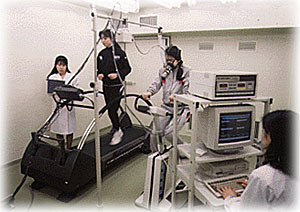Graduate School
The Graduate School of Home Economics was established with the objective of
contributing to the nation's cultural enhancement and improvement by teaching and carrying
out research in advanced, specialized academic theory and applications related to human
lives and by nurturing deep scholarship and research skills. A master's program is
available for each of the academic related disciplines: Child Studies, Food and Nutrition,
Housing, Clothing, and Economics for Well-being. Each program offers a unique curriculum.

Child Studies: This Division, offering Instruction
by faculty members well-versed in a variety of specialized fields and featuring close
interdisciplinary communication, was created to carry out advanced education and research
in both theoretical and practical aspects of child studies. Lectures and seminars are
characterized by small numbers of students and instruction tailored to meet individual
needs. Numerous electives are offered in addition to the basic courses, respecting student
independence and allow-ing each student to make choices that transcend academic
boundaries.
Food and Nutrition: Students in this Division pursue the
chemical analysis of food and clarify the relationship between nutrients and the body,
with the goal of developing a deeper scholarship and honing their research skills in the
specialized field of food and nutrition. The faculty consists of leaders and experienced
researchers in the field, with instruction being carried out through lectures, seminars
and laboratory activities.
Housing: This Division is designed to help students
develop rich expertise and hone their research skills in the field based on a foundation
of specialized theory on the purpose and direction of housing. Students pursue the various
sciences necessary to create human living spaces for a more abundant life in all respects
and master housing planning skills that allow for the creative development of housing.
These activities are based on an understanding of 1) housing
life, for which students study human sociology, the foundation for all space planning; 2) facilities and interior environments necessary to provide more
comfortable living spaces; and 3) housing issues, for which
students examine the purpose and direction of the human dwelling as an integral part of
the environment called society.
Clothing: Students in this Division are expected to
develop creative research skills based on a mastery of advance,d scholarship in basic
theory and applications in the field of clothing. Students examine the characteristics of
natural and synthetic fibers as basic materials in our daily lives. From a human
engineering standpoint, the making and wearing of clothing is related to clothing
formation, environment, and functions. From an aesthetic perspective, it is related to
ethnic culture and history in terms of the aesthetics and cultural history of clothing.
From the perspective of consumers, it is closely related to consumption issues.
Economics for Well-being: Students in this Division
pursue economic analysis for social welfare, and learn to use the methodology of economics
to probe problems relating to daily life. In particular, they study ways of managing and
improving human life. The course includes fundamental life economics and the management of
the quality of life as a part of the human environment and well-being. These curriculums
are based on an understanding of labor and consumer economics, national economy, and
current theories of economics. There are numerous elective subjects for living theory in
the curriculum: home management, life materials, living environment, time use for living,
consumer issues, life security, and so on.
Each of the Divisions offers well-equipped research facilities with specialized
books and journals from Japan and abroad. Each year a number of students completing the
master's program continue on to study for a doctoral degree.
